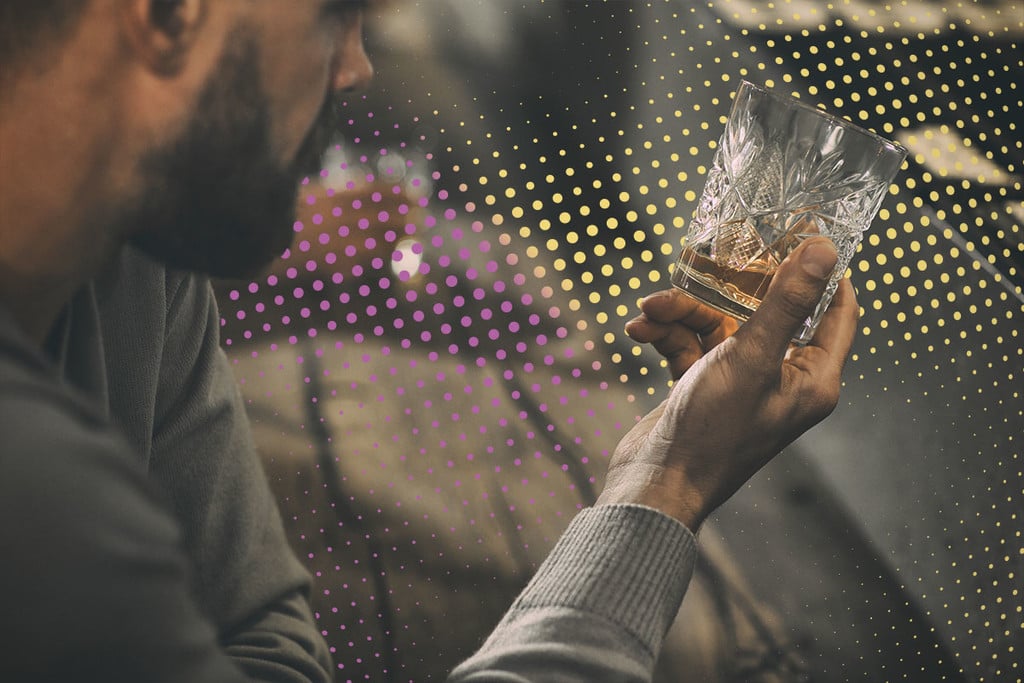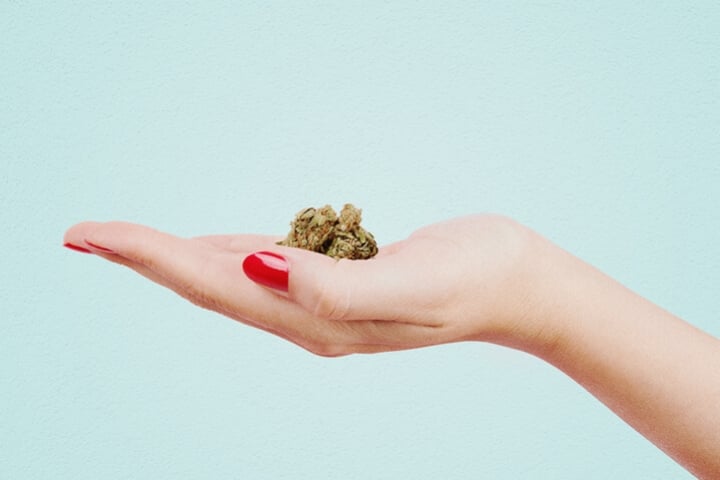.

The Relationship Between Cannabis Use and Domestic Violence
Often, studies surrounding cannabis focus on the health of the individual. However, when trying to assess the impact of a given drug, it's important to look at the effects it may or may not have on interactions between people, including couples. Here we ask, is there a link between cannabis and domestic abuse?
Contents:
There is a stereotype that those who smoke weed are chilled out and harmless. And indeed, this is true in some cases. For most, the idea that there may be a relationship between cannabis use and the perpetration of domestic abuse, or intimate partner violence (IPV), would seem unlikely, shocking, and sad.
Here, we look at studies that attempt to discover whether there is an association between cannabis and IPV, and if so, what that association may be.
Substance Use and IPV
It has long been known that substance abuse is a significant risk factor when it comes to predicting IPV.
Studies such as those by Stuart et al.[1] and Smith et al.,[2] to name but two, demonstrate the strong, positive correlation between alcohol/drug use and domestic violence within couples. Conclusions tend to be bleak, indicating that using certain drugs is likely to influence perpetration or victimisation in IPV.
For instance, the study conducted by Smith et al. illuminates the fact that different drugs, and different combinations of drugs, are likely to cause different outcomes. Alcohol and cocaine are most likely to be associated with committing IPV, while cannabis and opioids are most likely to be associated with a user being the victim of IPV.
Another study, by Kraanen et al.,[3] indicates similar findings. They set out to investigate whether drug use could be used to predict the occurrence of IPV within couples. Ultimately, they concluded it could. In males, they found that alcohol and cannabis use concurrently predicted IPV perpetration and/or victimisation. In females, alcohol and cocaine use were the strongest predictors. Perhaps unhelpfully, grouping perpetration and victimisation together means that it can be hard to determine what role the substances actually play.
Given that, it’s evident that while a correlation between substance use and IPV does exist, it is not as simple as saying that using substances is more likely to cause one to commit IPV. However, it does seem likely that it makes one more likely to be involved in a relationship within which IPV occurs.
Cannabis Use and IPV: Is There Cause for Concern?
But what role does cannabis play in the occurrence of IPV? Before continuing, it’s worth noting that, as things stand, it’s pretty hard to draw a conclusion one way or another. Even harder is assessing whether cannabis use (or wider substance use for that matter) plays a causal role in IPV perpetration/victimisation, or whether it is a symptom of something else.
Studies Demonstrating a Positive Correlation
There are a number of studies that show a positive correlation between cannabis use and the occurrence of IPV.


-
Shorey et al.
Published in 2018, a study by Shorey et al.[4] found a positive relationship between cannabis use and domestic abuse.
The meta-study analised data from 14 previous studies to ascertain if there was a significant relationship between cannabis and domestic abuse. The authors then conducted their own research, and tried to account for other factors such as alcohol abuse and anti-social behaviour disorders.
In line with the findings of Low et al.,[5] it was concluded that men who used alcohol and cannabis were at a greater risk of IPV perpetration compared to men who used alcohol alone. Though this does not entirely isolate cannabis as a risk factor on its own, it does indicate that, at least in conjunction with alcohol, it increases the risk of IPV.
It is worth noting that for their own research, the study authors focused only on men who had already been prosecuted for committing domestic violence. This sample raises clear methodological issues due to the lack of control group. By focusing on those who had already perpetrated IPV, this research tells us more about the relationship between cannabis and IPV among previous perpetrators, consequently limiting our ability to make generalisations on the issue at large.
-
Cunradi et al.
A study from 2015 by Cunradi et al.[6] demonstrates similar findings. Interestingly, the aim of this study was to discover what impact concordant or discrepant substance use had. This means if one partner uses and another does not, how does this change the dynamic in regard to IPV?
Once more, the conclusions were fairly bleak. It found that in discrepant, female-only drinking couples, male-female IPV was more likely to occur. Likewise, in couples in which both individuals used cannabis, male-female IPV was again more likely to occur. However, in couples that demonstrated discrepant cannabis use where only the male used it, occurrences of female-male violence were more likely.
One major issue about generalising from this study is that every couple included in the sample lived within the state of California. While California may be a big place, it perhaps does not provide a broad-enough demographic from which to make global assumptions. Nevertheless, the findings are interesting, and the demonstration of the relationship between concordance/discrepancy and abuse is highly illuminating.


Studies Demonstrating a Negative Correlation
So far, we have focused on studies that suggest cannabis plays a role in increasing the likelihood of domestic abuse. But there is also evidence to suggest otherwise.
-
Smith et al.
A 2015 study, again by Smith et al.,[7] is perhaps the most significant in terms of suggesting that cannabis and domestic abuse may in fact share an inverse relationship.
Taking 634 couples and assessing them over a 9-year period, it looked to discover whether cannabis use increased or decreased the likelihood of IPV perpetration/victimisation. Importantly, it also asked couples about occurrences of IPV prior to marriage.
On the whole, the study found a significantly negative relationship between concurrent cannabis use and domestic abuse. The only instance in which cannabis use was associated with a greater likelihood of abuse was in couples where only the female used it, and in which the female had perpetrated IPV in the year prior to marriage. Outside of this context, cannabis was not found to increase the likelihood of abuse.
Perhaps unsurprisingly, in couples where both partners used cannabis, abuse rates were lowest.
While a difficult task, this research did attempt to account for other factors, such as anti-social behaviour disorders—though this is always hard, as not everyone who has these disorders has been diagnosed.
There are a few limitations surrounding this study, some of which the authors themselves point out. The major issue is that considering cannabis use as a singular metric does not reveal the whole story. For instance, if there is a causal factor at play, it could be the high itself, the effects of continued usage, or withdrawal from ceasing usage. Essentially, this point shows that while it may be possible to draw general conclusions, pinpointing which factors are actually at play is much more difficult.
Furthermore, it seems that while the study authors attempted to account for anti-social behaviour disorders, further alcohol and drug use were not taken into account, meaning that we get a very narrow view of what is likely a much broader picture.
Conclusion: What Role Does Cannabis Play in Domestic Abuse?
As can be seen, research into the association between cannabis use and IPV is sparse, with hardly any dedicated research focusing specifically on cannabis use. Even when it has, researchers have often struggled to isolate cannabis use from other factors.
In fairness, though, it is well known that cannabis is often used alongside other drugs—and by many individuals who suffer from mental illnesses—and therefore, trying to assess cannabis use in isolation may be near-impossible, and perhaps not all that illuminating.
By recognising that occurrences of IPV are higher in those who use cannabis alongside other drugs, and those who suffer from mental illness, it helps us build a bigger picture of the intricate interactions between substance abuse, illness, and domestic abuse.
- The role of drug use in a conceptual model of intimate partner violence in men and women arrested for domestic violence - PubMed https://pubmed.ncbi.nlm.nih.gov
- Intimate partner violence and specific substance use disorders: findings from the National Epidemiologic Survey on Alcohol and Related Conditions - PubMed https://pubmed.ncbi.nlm.nih.gov
- Prediction of intimate partner violence by type of substance use disorder - PubMed https://pubmed.ncbi.nlm.nih.gov
- Marijuana use is associated with intimate partner violence perpetration among men arrested for domestic violence https://www.ncbi.nlm.nih.gov
- APA PsycNet https://doi.apa.org
- SAGE Journals: Your gateway to world-class journal research https://journals.sagepub.com
- Couples’ marijuana use is inversely related to their intimate partner violence over the first nine years of marriage https://www.ncbi.nlm.nih.gov









































